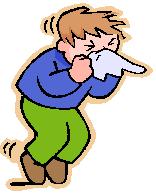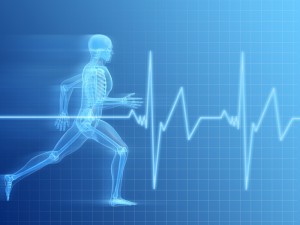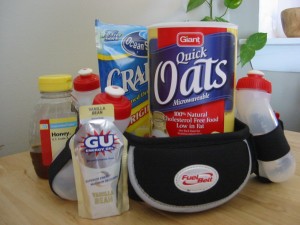 Whether training for a marathon, a triathlon, a 5K, or nothing at all it’s always worthwhile to set healthy eating goals. I would like to tackle the much larger topic of healthy eating over a series of posts and here will be focusing on what the best practices are with regard to meals for the final week before a marathon.
Whether training for a marathon, a triathlon, a 5K, or nothing at all it’s always worthwhile to set healthy eating goals. I would like to tackle the much larger topic of healthy eating over a series of posts and here will be focusing on what the best practices are with regard to meals for the final week before a marathon.
For the past nine weeks I have been averaging somewhere between 30 and 35 miles of running each week and the calories burned during those sessions adds up. On my longest runs, my Polar watch said I burned about 1800 calories so I can fully expect that running a full 26.2 miles will burn at least 2000 calories. I thought a good starting point for this post would be to learn how many calories I should be consuming. According to a basic Caloric Needs Calculator, I need around 1900 calories a day.
Doing a little math (not at all my strong suit), knowing I will burn 2000 calories on Sunday, if I want to maintain my current weight that means this week I should try to consume an extra 285 calories per day bringing my daily intake to 2185. Had I started thinking about my training diet when I started training, I probably would have followed the rule of thumb to add about 100 calories for every mile to my daily diet. Unfortunately, you can’t just randomly add calories; it’s important to know what layers of the food pyramid those calories should be coming from. If I had my way they’d all come from the tip top fats, sweets, and dairy categories.
MarathonRookie.com suggests that 65% of calories should come from good, complex carbohydrates, 10% from low fat and lean proteins, 20-25% from unsaturated fats and all balanced with plenty of vitamins, calcium, and iron. Carbohydrates provide the glycogen necessary to fuel the body through a long run so it seems that if I build up the glycogen stored in my body the week before I will have sufficient fuel to burn on race day.
Unfortunately (or perhaps, fortunately) I am not a calorie counter. I simply eat until I’m full and often until I’m just about stuffed. I like food, what can I say? I also know from experience and from research that it’s not smart to vary the diet too much before race day. The body gets used to processing certain foods and I have no intention of messing with that system before my first marathon. I would, however, like to identify the best balanced diet with the foods I normally eat and with the food already in my kitchen though there are plenty of good marathon recipes out there. Any special recipes or best foods you want to share?
I believe in writing this that I have figured out that my own personal marathon week diet needs to be the right percentages of the food pyramid with types of food my body is already used to. I will err on the side of adding more carbs and do my best to make sure they are complex carbs like cereal, oatmeal, wheat bread, pasta, carrots, and apples. I will also use the day before the run to “carb load” and I admit I’m looking forward to it!
And for future training, I’ll start my diet off at the beginning.
 One of the things I have enjoyed most about having run a marathon is how much I learned along the way. I am very aware that I have barely scratched the surface of most topics related to running and training and I find it encouraging that there is always something new to learn about the sport. Part of running is science and understanding how the body works and how all the muscles work together, and part of running simply personal and figuring out what works best for you.
One of the things I have enjoyed most about having run a marathon is how much I learned along the way. I am very aware that I have barely scratched the surface of most topics related to running and training and I find it encouraging that there is always something new to learn about the sport. Part of running is science and understanding how the body works and how all the muscles work together, and part of running simply personal and figuring out what works best for you.
 When I decided I wanted to run a marathon it was last October and I was only slightly enamored with the idea. Knowing that I might get serious about it, I continued to run through November and December but only put in 9-12 miles a week, maybe a little more on warmer days. By the end of December I had committed myself to the March 1st marathon and my running friend and I decided we would officialy start training January 3rd.
When I decided I wanted to run a marathon it was last October and I was only slightly enamored with the idea. Knowing that I might get serious about it, I continued to run through November and December but only put in 9-12 miles a week, maybe a little more on warmer days. By the end of December I had committed myself to the March 1st marathon and my running friend and I decided we would officialy start training January 3rd. I believe it is not just coincidence that I have made it through this entire 2009 winter without a cold. I don’t typically get sick to begin with (knocking on wood now) and the last time I had a sore throat and stuffed up noise was just after the Christmas holidays. My big goal for this past winter was to run through it, and November and December were months I used to get used to running in the cold. I was outside for 3-4 mile runs three times a week. I had been mentally preparing to start true marathon training after New Years and so my first few runs of 2009 were indeed with a runny nose, but it didn’t last long. I have been sniffle-free this winter while everyone around me has had the flu, the common cold, aches and pains, and I believe I have running to thank for keeping my immune system strong.
I believe it is not just coincidence that I have made it through this entire 2009 winter without a cold. I don’t typically get sick to begin with (knocking on wood now) and the last time I had a sore throat and stuffed up noise was just after the Christmas holidays. My big goal for this past winter was to run through it, and November and December were months I used to get used to running in the cold. I was outside for 3-4 mile runs three times a week. I had been mentally preparing to start true marathon training after New Years and so my first few runs of 2009 were indeed with a runny nose, but it didn’t last long. I have been sniffle-free this winter while everyone around me has had the flu, the common cold, aches and pains, and I believe I have running to thank for keeping my immune system strong.  There is no question that individual runners and athletes will find the diet, routine, and training that works best for their own goals, pace, and body type. An interesting debate on
There is no question that individual runners and athletes will find the diet, routine, and training that works best for their own goals, pace, and body type. An interesting debate on  Whether training for a marathon, a triathlon, a 5K, or nothing at all it’s always worthwhile to set healthy eating goals. I would like to tackle the much larger topic of healthy eating over a series of posts and here will be focusing on what the best practices are with regard to meals for the final week before a marathon.
Whether training for a marathon, a triathlon, a 5K, or nothing at all it’s always worthwhile to set healthy eating goals. I would like to tackle the much larger topic of healthy eating over a series of posts and here will be focusing on what the best practices are with regard to meals for the final week before a marathon. At the end of a long run, the legs are inevitably tired which is to be expected. I understand the important role that the knees play in running and that they certainly carry a lot of the body’s weight and movement. Doing core exercises and strengthening and stretching the pelvis, hips, and legs will help the knees and legs remain strong during a run. Without a strong core to keep the body in a nice straight line while running, your knees will bear the brunt of any sideways movement of the body and you’ll feel the pain later.
At the end of a long run, the legs are inevitably tired which is to be expected. I understand the important role that the knees play in running and that they certainly carry a lot of the body’s weight and movement. Doing core exercises and strengthening and stretching the pelvis, hips, and legs will help the knees and legs remain strong during a run. Without a strong core to keep the body in a nice straight line while running, your knees will bear the brunt of any sideways movement of the body and you’ll feel the pain later. I have been a long-time subscriber to SELF Magazine and kept back issues for more years than I would like to admit. I’ve seen the magazine change and evolve and always found something in its pages that interested me throughout my teenage years where I just wanted to be inspired to my college dieting years to my adult years of focusing on healthy fitness. To no fault of SELF (sorry SELF), I have been letting my subscription run out in favor of reading Runner’s World, running websites, and blogs which appeal directly to my current goals.
I have been a long-time subscriber to SELF Magazine and kept back issues for more years than I would like to admit. I’ve seen the magazine change and evolve and always found something in its pages that interested me throughout my teenage years where I just wanted to be inspired to my college dieting years to my adult years of focusing on healthy fitness. To no fault of SELF (sorry SELF), I have been letting my subscription run out in favor of reading Runner’s World, running websites, and blogs which appeal directly to my current goals. For the last few weeks I have been dabbling lightly with the best pre-run routine for long Sunday runs. I’m acutely aware of the need to fuel up before heading out but I’ve also become more in tune with the amount of time it takes for my body to wake up and go through its own routines.
For the last few weeks I have been dabbling lightly with the best pre-run routine for long Sunday runs. I’m acutely aware of the need to fuel up before heading out but I’ve also become more in tune with the amount of time it takes for my body to wake up and go through its own routines.